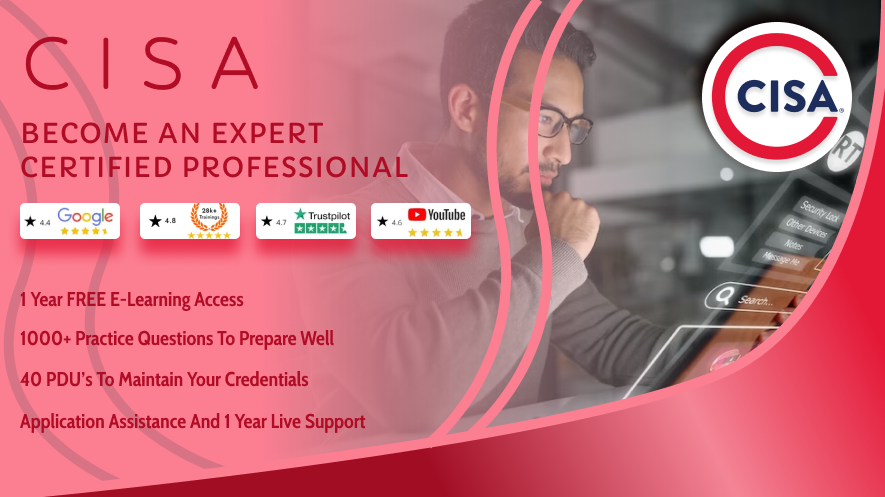
Unlocking Opportunities with CISA Certification Training: A Comprehensive Guide to CISA Certification
In today’s rapidly evolving digital landscape, information security has become paramount for organizations across industries. With the increasing reliance on technology, protecting sensitive data and ensuring secure systems have become critical components of business operations. This heightened focus on cybersecurity has led to a surge in demand for skilled professionals who can navigate complex security challenges effectively. Among the numerous certifications available, the Certified Information Systems Auditor (CISA) certification stands out as a globally recognized credential for professionals in the field of information systems auditing, control, and assurance.
Understanding CISA Certification
The Certified Information Systems Auditor (CISA) certification is administered by ISACA (Information Systems Audit and Control Association), a leading global organization in information governance, control, security, and audit. Established in 1978, CISA has gained widespread recognition and credibility among organizations, governments, and professionals worldwide.
CISA certification validates an individual’s expertise in assessing, controlling, monitoring, and auditing an organization’s information technology and business systems. It demonstrates proficiency in various domains critical to information systems auditing, including:
- Auditing Information Systems: Understanding the fundamentals of auditing, governance, and control frameworks is essential for CISA professionals. They learn to evaluate the effectiveness of information systems processes and practices to ensure compliance with organizational policies and standards.
- Governance and Management of IT: CISA candidates acquire knowledge of IT governance frameworks and best practices for aligning IT strategies with business objectives. This includes understanding the roles and responsibilities of key stakeholders in managing IT resources and risks.
- Information Systems Acquisition, Development, and Implementation: CISA professionals are equipped to assess the processes involved in acquiring, developing, and implementing information systems. They ensure that projects adhere to established standards, policies, and procedures while mitigating potential risks.
- Information Systems Operations and Business Resilience: CISA certification covers the management of information systems operations, including data backup, disaster recovery, and business continuity planning. Professionals learn to identify vulnerabilities and implement measures to safeguard critical business operations.
- Protection of Information Assets: Understanding the principles of information security is paramount for CISA professionals. They learn to assess and mitigate risks related to confidentiality, integrity, and availability of information assets, including data privacy regulations and compliance requirements.
Why Pursue CISA Certification?
Career Advancement Opportunities:
CISA certification opens doors to a wide range of career opportunities in the field of information systems auditing, risk management, and cybersecurity. Organizations across industries, including finance, healthcare, government, and consulting firms, value CISA professionals for their expertise in evaluating and enhancing information systems controls and processes.
Global Recognition and Credibility:
CISA is globally recognized as a leading certification for information systems auditors and security professionals. Holding a CISA certification demonstrates a commitment to excellence and professionalism in the field of information systems auditing and control.
Competitive Edge in the Job Market:
In today’s competitive job market, employers seek candidates with specialized skills and certifications that demonstrate their proficiency and credibility. CISA certification sets candidates apart by validating their expertise and knowledge in information systems auditing and control.
Enhanced Earning Potential:
Professionals with CISA certification often command higher salaries and greater earning potential compared to their non-certified counterparts. The specialized skills and expertise gained through CISA training and certification make individuals valuable assets to organizations seeking to mitigate risks and ensure compliance with regulatory requirements.
Continuous Professional Development:
CISA certification requires ongoing professional development and adherence to ISACA’s Code of Professional Ethics and Continuing Professional Education (CPE) requirements. This ensures that CISA professionals stay updated on emerging trends, technologies, and best practices in information systems auditing and control.
Key Components of CISA Certification Training
Comprehensive Exam Preparation:
CISA certification candidates undergo rigorous exam preparation to master the key concepts, principles, and practices outlined in the CISA job practice domains. Training programs typically cover a wide range of topics, including information systems auditing standards, risk management, control frameworks, and regulatory compliance requirements.
Hands-On Experience and Case Studies:
Effective CISA training programs incorporate hands-on experience and real-world case studies to provide candidates with practical insights into information systems auditing and control processes. Practical exercises and simulations allow candidates to apply theoretical knowledge to real-world scenarios and enhance their problem-solving skills.
Expert-Led Instruction and Guidance:
Experienced instructors and subject matter experts play a crucial role in CISA certification training, providing candidates with guidance, mentorship, and support throughout the learning journey. They offer valuable insights, best practices, and practical tips to help candidates prepare effectively for the CISA exam and excel in their careers.
Interactive Learning Resources:
CISA training programs leverage a variety of interactive learning resources, including online courses, webinars, study guides, practice exams, and virtual labs. These resources enable candidates to customize their learning experience, reinforce key concepts, and assess their readiness for the CISA exam.
Exam Readiness and Confidence Building:
CISA training programs focus on building exam readiness and confidence among candidates by providing comprehensive exam preparation materials, practice tests, and mock exams. Candidates receive feedback on their performance and areas for improvement, allowing them to identify and address knowledge gaps effectively.
Conclusion
In an era of unprecedented digital transformation and cybersecurity threats, organizations require skilled professionals who can safeguard their information assets and ensure secure and resilient systems. CISA certification equips individuals with the knowledge, skills, and credentials needed to excel in the field of information systems auditing and control.
By pursuing CISA certification training, professionals can unlock a world of opportunities for career advancement, professional growth, and personal fulfillment. Whether you’re aspiring to become a certified information systems auditor or seeking to enhance your existing skills and expertise, CISA certification offers a pathway to success in today’s dynamic and challenging cybersecurity landscape.
Invest in your future, enhance your career prospects, and make a difference in the world of information security with CISA certification training. Start your journey today and embark on a rewarding and fulfilling career in information systems auditing and control.




